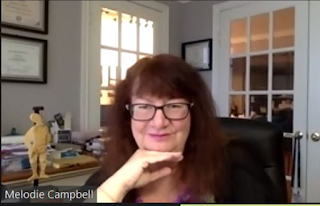I'm delighted to welcome Kristin Kisska back to SleuthSayers today with this guest post. It's perfect timing because today is a special day for her--publication day for her first novel! Congratulations, Kristin!
--Barb Goffman
Game On
by Kristin Kisska
%20websize.jpg) |
| Credit-Lindsey Pantele Photography |
Picture this.
A diligent, twenty-something graduate student sitting through her fourth lecture of the day, the statistics class, which had earned the reputation for being the dullest required course for the degree. She’s two semesters deep into her MBA program and wishes she’d had the foresight to skip this one lecture. But with her notebook open and a No. 2 pencil in hand (this story is set in the analog era, not digital), she waits for the bell to ring, announcing the start of class.
But instead of yet another mind-numbing lecture swirling with math terms like means, medians, and regression lines, the professor introduces a topic that perks her up—game theory, a mathematical model of corporate and geo-political strategy. This has been used to analyze everything from the Cold War, mergers and acquisitions of global companies, privatizing utilities (hello, Ma Bell), and even chess strategies.
While most of this high-level concept was beyond this starry-eyed grad student’s mere human-level grasp of math, one of game theory’s core elements resonated with her:
Every player (a) is rational, and (b) will always make decisions in their best interest.
The element’s inverse truism is that if a player does something that seems counter to their best interest, then the opponent does not have complete or perfect information.Spoiler alert. This grad student was me.
Let’s fast forward a couple decades (or three). I’ve since traded my global corporate finance hat for my #SuspenseGirl author hat. Not many lessons from my MBA days have helped me in my current career path, but I’ve used this one element from that epic statistics lecture every single time I sit down to write fiction.
When it comes to fiction—particularly crime fiction—astute authors can use this game theory element to their advantage. By layering in a character’s unexpected behavior, either subtle or obvious, a crime fiction author can signal to the reader that new—surprising—information will be forthcoming. It can elevate the reader’s experience by hinting at the richness of the character’s as-yet unrevealed backstory:
Secrets. Relationships. Unresolved traumas. Character wounds. Behind-the-scenes conflicts. Or even a deeper understanding of the stakes involved.
Let’s consider the classic movie Star Wars. When Obi-One Kenobi is fighting Darth Vader, the first-time viewer would expect Obi-One to fight for his life. Survival is a rational, relatable, and universally assumed goal. But for no explicable reason, when Obi-One sees Luke Skywalker watching the fight from a distance, he surrenders by raising his lightsaber and allows Vader to strike a death blow. In the moment, we (the viewers) are as confused and shocked as Luke Skywalker. It’s not until later that we learn that by dying, Obi-One could amplify his power for good because he becomes one with the energy of the Force.
Or, as is in the case of my debut novel, The Hint of Light, (published today!), the unconditional love of a mother toward her child can make her actions seem irrational and unpredictable. In real life, over-protective mothers are so common in society we’ve labeled them as mama bears, helicopter moms, and even tiger moms, but these terms boil down to the same concept. The maternal-child relationship can be so intense it can make people do very strange things when placed under pressure. A mother, in an effort to keep her child safe, can seem both irrational and unpredictable. And yet, when viewed from the mother’s lens with her specific interpretation of events, her priorities, and the options open to her, readers may understand the extreme choices she has made.
We could carry this example one step further by also challenging the first part of this game theory element—that all players are rational. It’s not always a given. In fact, we have a thriving subgenre called psychological suspense, which depends on the concept of the unreliable narrator. But I addressed this in another Sleuthsayers blog post, Deconstructing a Narrator: https://www.sleuthsayers.org/2020/05/deconstructing-narrator.html
Now, I have a little game theory homework for you. What character in a novel or movie made a choice that shocked you? What new information did you learn after the fact that made their choice seem reasonable?
PS - Let's be social:
Twitter @KKMHOO
Facebook - @Kristin Kisska
Instagram - @KristinKisskaAuthor
Website - KristinKisska.com

.png)



















